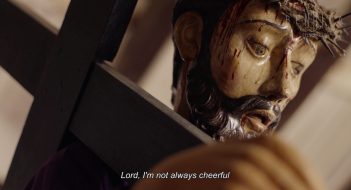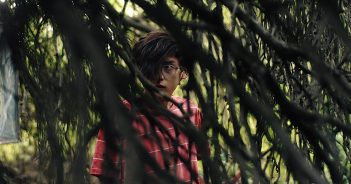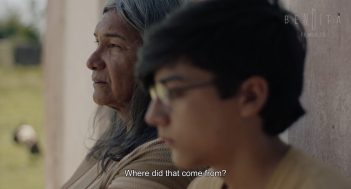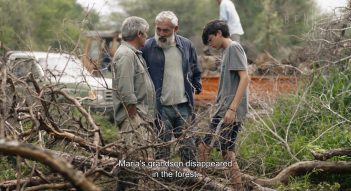By Robert St. Martin
 Los Angeles, CA (The Hollywood Times) 7/12/23 – Early in the lineup of films on Sunday July 16 at this year’s Outfest Los Angeles is a quietly intense film from Argentina, Almamula (2023), directed by Juan Sebastian Torales. It premiered recently at the Berlin International Film Festival. Almamula is a semi-autobiographical film with a strong sense of place and that place is the forest in a very rural part of Northwest Argentina, far from the big cities. As Torales explained in an interview, “the film is like a love letter to the child who lives inside of me.” The story centers across 12-year-old Nino (played brilliantly by Nicolás Diaz) and his family, as his parents decide to relocate to their old family home in the countryside near the village of Santiago del Estero, after an incident where Nino is attacked and beaten by his male schoolmates in a violent, homophobic assault. We see this in the film’s opening scenes: The frightened 12-year-old is hiding in a shed with another boy and then pursued by a mob of other kids, knocked down, punched and kicked repeatedly, before they finally dump him into the back of an old truck which is full of toads. From the start, the story seems to alternate between realism and fantasy, and the film’s camerawork reflects these conflicting patterns.
Los Angeles, CA (The Hollywood Times) 7/12/23 – Early in the lineup of films on Sunday July 16 at this year’s Outfest Los Angeles is a quietly intense film from Argentina, Almamula (2023), directed by Juan Sebastian Torales. It premiered recently at the Berlin International Film Festival. Almamula is a semi-autobiographical film with a strong sense of place and that place is the forest in a very rural part of Northwest Argentina, far from the big cities. As Torales explained in an interview, “the film is like a love letter to the child who lives inside of me.” The story centers across 12-year-old Nino (played brilliantly by Nicolás Diaz) and his family, as his parents decide to relocate to their old family home in the countryside near the village of Santiago del Estero, after an incident where Nino is attacked and beaten by his male schoolmates in a violent, homophobic assault. We see this in the film’s opening scenes: The frightened 12-year-old is hiding in a shed with another boy and then pursued by a mob of other kids, knocked down, punched and kicked repeatedly, before they finally dump him into the back of an old truck which is full of toads. From the start, the story seems to alternate between realism and fantasy, and the film’s camerawork reflects these conflicting patterns.
 The village of Santiago del Estero isn’t exactly gay-friendly, but there he is treated with concern rather than hatred, as a lost member of the Catholic flock who can resume a Christian way of living if he receives the right guidance. Like other Argentine youngsters in the town, Nino is attending lessons towards the Catholic ritual of confirmation with the local parish priest, whose piety is heavy-handed and whose hair (or wig) is the worst. Nino is fascinated by the almost-naked image of Jesus on the cross and his bloody body portrayed in Catholic religious art. When the priest saying that he talks to God, Nino’s response is that he does as well but God does not answer. Nino’s very conservative religious upbringing fails to protect him from the normal hormonal rage of adolescence and his attraction to the male body.
The village of Santiago del Estero isn’t exactly gay-friendly, but there he is treated with concern rather than hatred, as a lost member of the Catholic flock who can resume a Christian way of living if he receives the right guidance. Like other Argentine youngsters in the town, Nino is attending lessons towards the Catholic ritual of confirmation with the local parish priest, whose piety is heavy-handed and whose hair (or wig) is the worst. Nino is fascinated by the almost-naked image of Jesus on the cross and his bloody body portrayed in Catholic religious art. When the priest saying that he talks to God, Nino’s response is that he does as well but God does not answer. Nino’s very conservative religious upbringing fails to protect him from the normal hormonal rage of adolescence and his attraction to the male body.
 As soon as they arrive in the village of Santiago del Estero, Nina hears about how his family’s housekeeper Maria has just lost her grandson into the surrounding forest. Panchito has gone missing for a week and no one knows what happened to him. Nino knows about the legend of the Almamula from the locals and he wonders if this fantastical creature that supposedly lives in the forest may have abducted Panchito. Nino and his sister Natalia (Martina Grimaldi) are told not to go into the forest. Their mother wants them to stay close to the house, the school, the church. But something in Nino is attracted to the wilder places, and he already knows that being part of the community is no guarantee of safety.
As soon as they arrive in the village of Santiago del Estero, Nina hears about how his family’s housekeeper Maria has just lost her grandson into the surrounding forest. Panchito has gone missing for a week and no one knows what happened to him. Nino knows about the legend of the Almamula from the locals and he wonders if this fantastical creature that supposedly lives in the forest may have abducted Panchito. Nino and his sister Natalia (Martina Grimaldi) are told not to go into the forest. Their mother wants them to stay close to the house, the school, the church. But something in Nino is attracted to the wilder places, and he already knows that being part of the community is no guarantee of safety.
 The story is framed by the symbolic poles of masculine and feminine powers. Nino’s mother Elsa (María Soldi) is typically feminine, vulnerable, protective, and religious. Nino’s father runs a business that involves clearing the forest in his crew of workers. Often, he seems like the absentee father but he does care about his son Nino. The spirit of the forest is represented by Natalia, the housekeeper for the family, who respects the wildness of the forest and knows its secrets.
The story is framed by the symbolic poles of masculine and feminine powers. Nino’s mother Elsa (María Soldi) is typically feminine, vulnerable, protective, and religious. Nino’s father runs a business that involves clearing the forest in his crew of workers. Often, he seems like the absentee father but he does care about his son Nino. The spirit of the forest is represented by Natalia, the housekeeper for the family, who respects the wildness of the forest and knows its secrets.
 The title of the film comes from this fantastical creature, Almamula, perhaps simply a supernatural mule whose terrifying cry presages death, which Nino hears at times. In this story, Almamula is very clearly a female figure, as depicted in a painting by his deceased grandmother which Natalia remembers they used to be afraid of when they were small. Nino finds the painting in a storage shed on the property and takes it because of its image of a shady person with red eyes in the tangled branches of a tree in the forest. His older sister Natalia is bored and allowed to invite friends – female and male to visit her at the big country house. Natalia is now at the age where she is already quite sexually aware and enjoys toying with the idea of summoning the Almamula by kissing another girl. Strange noises in the night make us imagine a horror film but nothing seems to materialize.
The title of the film comes from this fantastical creature, Almamula, perhaps simply a supernatural mule whose terrifying cry presages death, which Nino hears at times. In this story, Almamula is very clearly a female figure, as depicted in a painting by his deceased grandmother which Natalia remembers they used to be afraid of when they were small. Nino finds the painting in a storage shed on the property and takes it because of its image of a shady person with red eyes in the tangled branches of a tree in the forest. His older sister Natalia is bored and allowed to invite friends – female and male to visit her at the big country house. Natalia is now at the age where she is already quite sexually aware and enjoys toying with the idea of summoning the Almamula by kissing another girl. Strange noises in the night make us imagine a horror film but nothing seems to materialize.
 Nino is fascinated by the physiques of the men who work with his father among the trees as well as with a local handyman Malevo (Beto Frágola) who comes to the house to fix the ceiling fans and other things. These men who works with his father as well as the strapping young teenage male friends of his sister lead to unsettling erotic dreams for Nino. His confirmation class with the local priest seems to go array when he is asked about carnal sin and he needs to excuse himself to the bathroom. In the confessional, it is even worse. Nino is unable to talk to anyone about his desires, although he befriends Malevo who lives in a tent near the river and fishes there. It is this man who will counter the priest’s vision of mortal sin as damnation to Hell by suggesting that sin is an invention by the Catholic priests to control people.
Nino is fascinated by the physiques of the men who work with his father among the trees as well as with a local handyman Malevo (Beto Frágola) who comes to the house to fix the ceiling fans and other things. These men who works with his father as well as the strapping young teenage male friends of his sister lead to unsettling erotic dreams for Nino. His confirmation class with the local priest seems to go array when he is asked about carnal sin and he needs to excuse himself to the bathroom. In the confessional, it is even worse. Nino is unable to talk to anyone about his desires, although he befriends Malevo who lives in a tent near the river and fishes there. It is this man who will counter the priest’s vision of mortal sin as damnation to Hell by suggesting that sin is an invention by the Catholic priests to control people.
 This is a film follows a mostly realist format, constraining the supernatural. What dominates the film is the sexual tension in both the young and adult characters. The symbolic motifs are almost overloaded, as we experience them in the final scenes of the film. It is the almost-naked image of Christ on the cross that cannot defeat the natural forces of nature in the forest and the river. Some might object to the young age of Nino and his sexual awareness, but it seems quite akin to the experiences of young men at that age. Writer/director Juan Sebastián Torales has made a fine film worth seeing.
This is a film follows a mostly realist format, constraining the supernatural. What dominates the film is the sexual tension in both the young and adult characters. The symbolic motifs are almost overloaded, as we experience them in the final scenes of the film. It is the almost-naked image of Christ on the cross that cannot defeat the natural forces of nature in the forest and the river. Some might object to the young age of Nino and his sexual awareness, but it seems quite akin to the experiences of young men at that age. Writer/director Juan Sebastián Torales has made a fine film worth seeing.
 Juan Sebastián Torales is known for Le Warrior (2018) and La croix (2008). Born in 1982 in Santiago del Estero, Argentina, he studied film in the city of Córdoba, where he later worked as full professor of the Film Editing discipline at the university. Almamula screens at Outfest on Sunday, July 16, at 11:30 AM in Theatre 2 of the Directors Guild of America. It will also be available online for viewing via Outfest Screening, beginning July 17 through July 23. For tickets, go to: www.outfest.org.
Juan Sebastián Torales is known for Le Warrior (2018) and La croix (2008). Born in 1982 in Santiago del Estero, Argentina, he studied film in the city of Córdoba, where he later worked as full professor of the Film Editing discipline at the university. Almamula screens at Outfest on Sunday, July 16, at 11:30 AM in Theatre 2 of the Directors Guild of America. It will also be available online for viewing via Outfest Screening, beginning July 17 through July 23. For tickets, go to: www.outfest.org.




